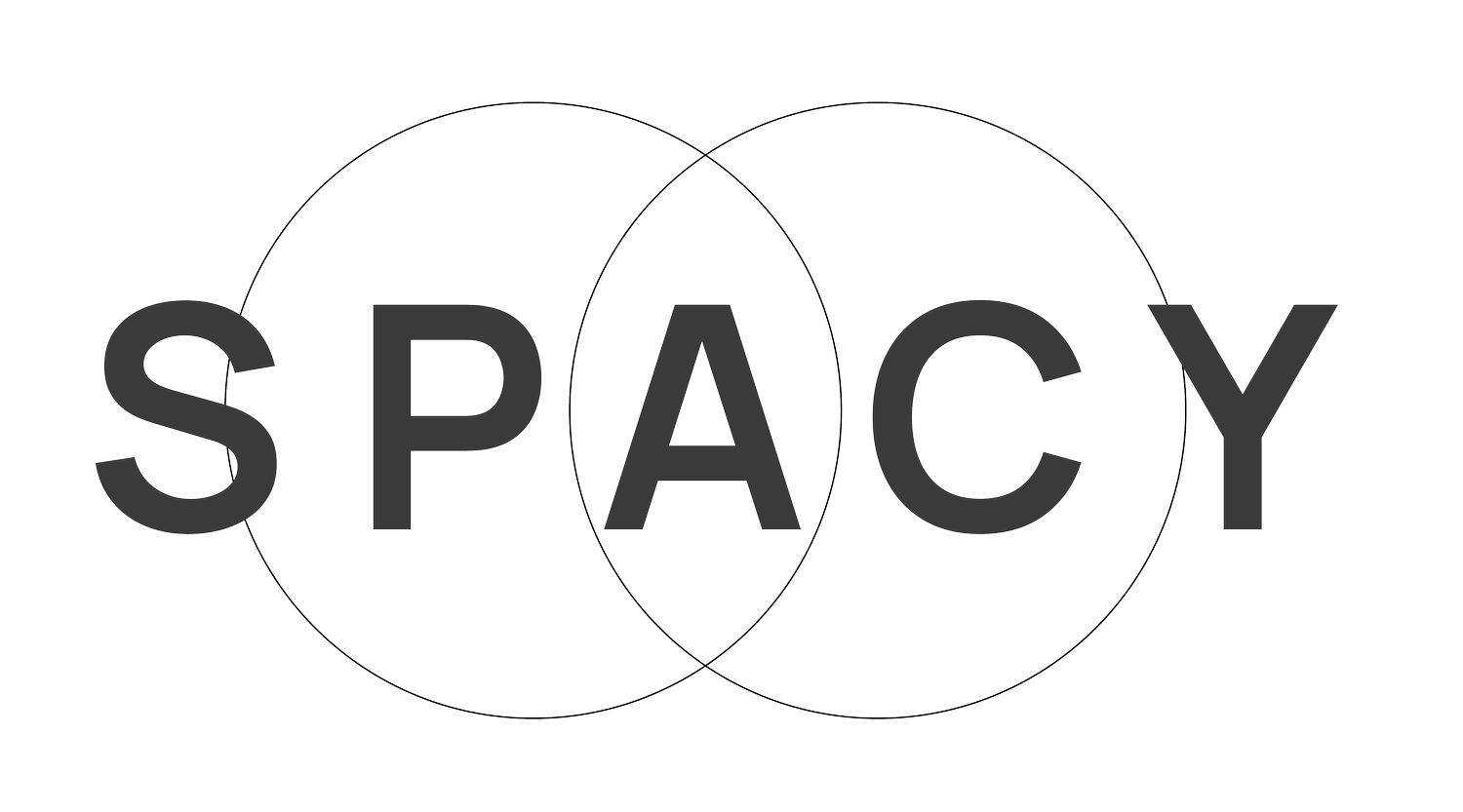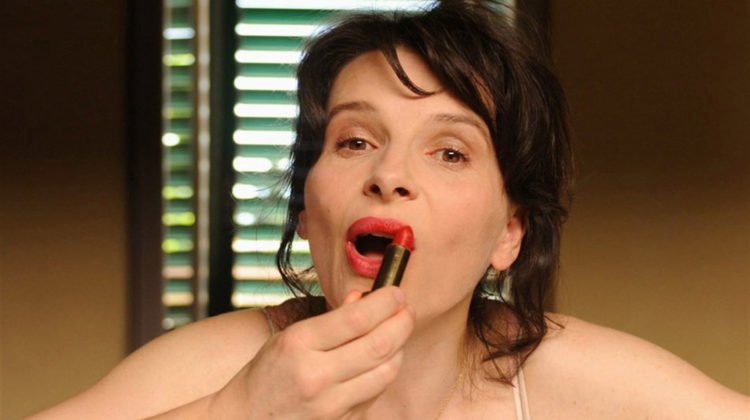

The Hour of Liberation Has Arrived
Heiny Srour, France/Lebanon/Oman/UK, 1974, 64 min
In the late 60s, Dhofar rose up against the British-backed Sultanate of Oman, in a democratic, Leninist guerrilla movement. Director Heiny Srour and her team crossed 500 miles of desert and mountains by foot, under bombardment by the British Royal Air Force, to reach the conflict zone and capture this rare record of a now mostly forgotten war.

Evan Gordon Presents: Impossible Horror
Justin Decloux, 2017, USA, 76 min
Featuring a live virtual post-screening Q&A with director Justin Decloux!
Lily, an insomniac filmmaker who is facing a crippling creative block, begins to hear a sinister scream outside her window every night. Convinced that she must find a way to help the person that is screaming, Lily heads into the darkness of her neighbourhood and meets Hannah, a veteran scream hunter, obsessed with putting a stop to the nightly occurrence. The women join forces to solve the bloodcurdling mystery and quickly discover that its true source may be an otherworldly threat that is driving its victims into madness - and Lily and Hannah are next.

The Hour of Liberation Has Arrived
Heiny Srour, France/Lebanon/Oman/UK, 1974, 64 min
In the late 60s, Dhofar rose up against the British-backed Sultanate of Oman, in a democratic, Leninist guerrilla movement. Director Heiny Srour and her team crossed 500 miles of desert and mountains by foot, under bombardment by the British Royal Air Force, to reach the conflict zone and capture this rare record of a now mostly forgotten war.
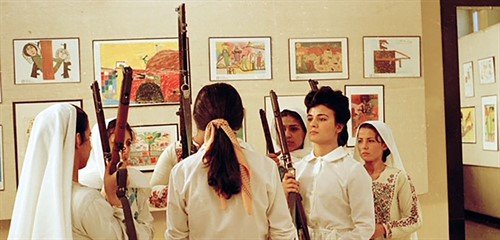
Leila and the Wolves
Heiny Srour, Lebanon/Palestine, 1984, 90 min
Leila, a young Lebanese woman living in London, travels back in time through 20th century Lebanon and Palestine. Leila and the Wolves brings together documentary elements and evocations of Arab mythology. For several years, Srour captured images in often dangerous locations, combining them with archive films to reconstruct conventional historical narratives. Focusing on the often neglected political and social contributions of women, the film brings a feminist, but ironic perspective on the region's conflicted colonial past.

Mayabazar Presents: Band Baaja Baaraat
Mayabazar, a new monthly series spotlight the best of Indian cinema, presents their inaugural screening!
Maneesh Sharma, 2010, India, 140 mins
Shruti (Anushka Sharma), girl in her 20's, focused, determined as well ambitious. Bittoo (Ranveer Singh), on the other hand, has no real aim in life. They become partners in their very own “Wedding planning ka bijness”. Together, their friendship and business, enters the ups and downs of the lavish Delhi weddings and while trying to find themselves, Shruti and Bittoo discover each other.
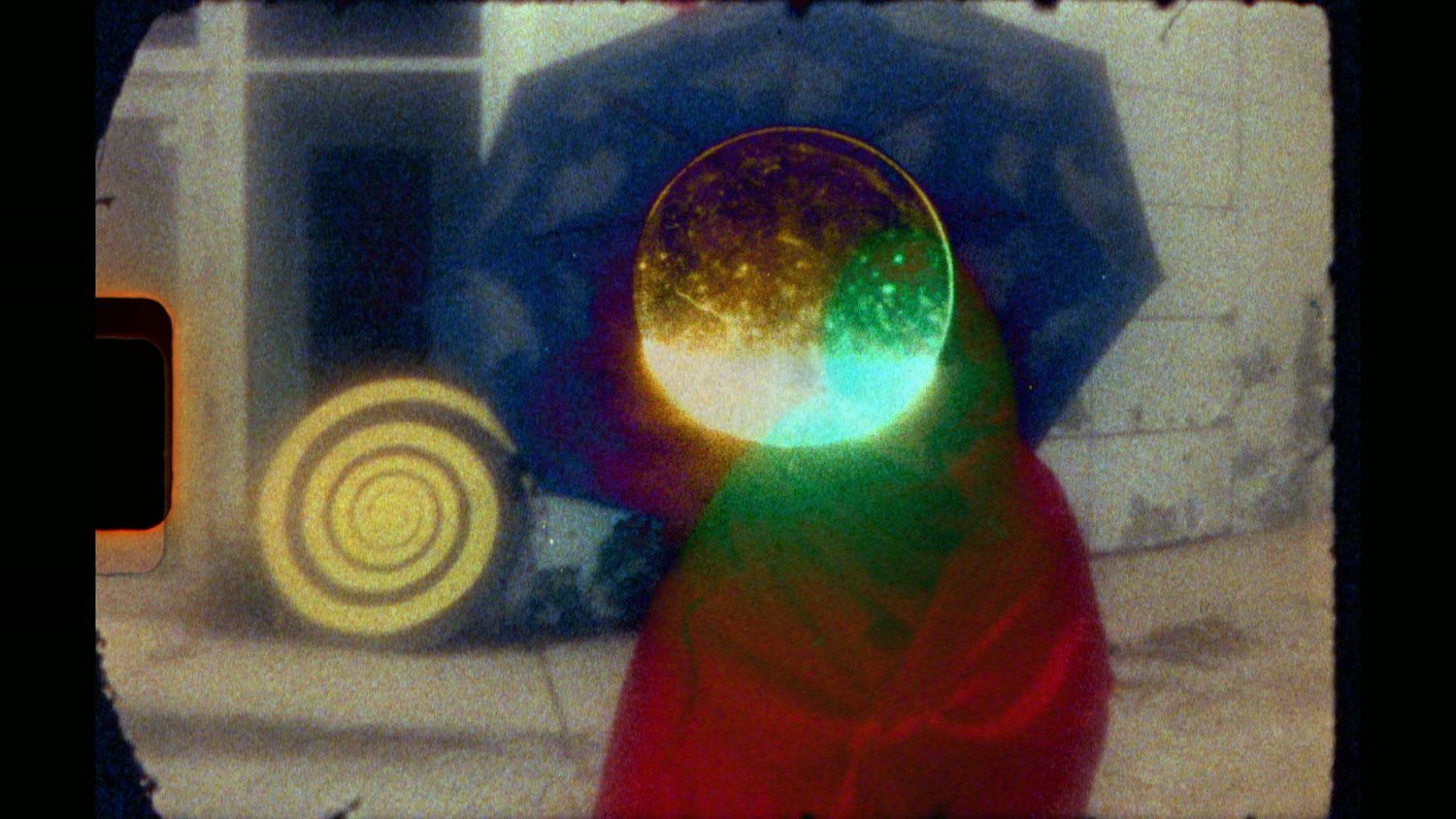
Body Prop
M. Woods, USA, 2020, 75 min
Following the screening will be an in-person Q&A with M. Woods.
BODY PROP is an avant-garde essay film and attack against the ontology of white imperialism. Made of mostly hand-processed super 8 film, 16mm, and archival video. The piece, in five movements, takes on the subject of the Body as a prop, as a body politic, as a simulation, and as a necropolitical expense, creating a “Cadaver Decomposition Island” of discarded scraps of Super 8 and archival material reveal the shadow of US nihilism within the advanced stage of hyperreality.
Combining original manifestoes (in the style of Situationism) with excerpts of Jean Baudrillard’s A System of Objects, Sartre’s Being and Nothingness and other treatises on phenomenological existentialism, Biblical passages from Genesis and Ecclesiastes, impeachment transcripts, Beloved by Toni Morrison, the speeches of Malcolm X, YouTube news archives, and dozens of other texts in conversation in a tumult of signs, oscillating in a trance between attempting to situate within and disassociate from the Body Prop. The cinema itself is a Body Prop - simultaneously full and devoid of feeling and sensory. Featuring an original score composed of Hip-Hop beats and experimental soundscapes created by director M Woods.
Warning: Body Prop contains accounts and representations of racism, violence, sex, and nudity. Parts of this work are based in actual events. Some parts contain fast edits and strobing imagery and that may negatively impact those viewers with epilepsy and other light-sensitive disorders.

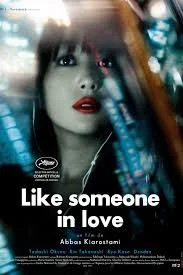

Love Hotel
Shinji Sōmai, 1985, Japan, 86 min
A tale of two broken souls. A call-girl named Yumi, “night-blooming flower,” and Tetsuro, a married man with a debt to the yakuza, have a violent rendezvous in a cheap love hotel. Years later, haunted by the memory of that night, they reconnect and begin a strange love affair. Determined to finish what they started, they return to the scene of their first macabre passion. With a taste for wicked absurdity and coursing with undercurrents of operatic emotion, at times veering into near-musical territory, Love Hotel is moved by the irrational forces that attract two bodies together. It’s a film with a uniquely materialist sense of eros manifested in Shinji Somai’s long takes, each shot a tightrope-like predicament flushed with earthly tension and livewire physicality. Made in the same year as Typhoon Club, this elegiac erotica is one of Somai’s most bewitching and unnervingly romantic works, a high-water mark of Nikkatsu Studio’s legendary Roman Porno cycle of films.

Love Hotel
Shinji Sōmai, 1985, Japan, 86 min
A tale of two broken souls. A call-girl named Yumi, “night-blooming flower,” and Tetsuro, a married man with a debt to the yakuza, have a violent rendezvous in a cheap love hotel. Years later, haunted by the memory of that night, they reconnect and begin a strange love affair. Determined to finish what they started, they return to the scene of their first macabre passion. With a taste for wicked absurdity and coursing with undercurrents of operatic emotion, at times veering into near-musical territory, Love Hotel is moved by the irrational forces that attract two bodies together. It’s a film with a uniquely materialist sense of eros manifested in Shinji Somai’s long takes, each shot a tightrope-like predicament flushed with earthly tension and livewire physicality. Made in the same year as Typhoon Club, this elegiac erotica is one of Somai’s most bewitching and unnervingly romantic works, a high-water mark of Nikkatsu Studio’s legendary Roman Porno cycle of films.
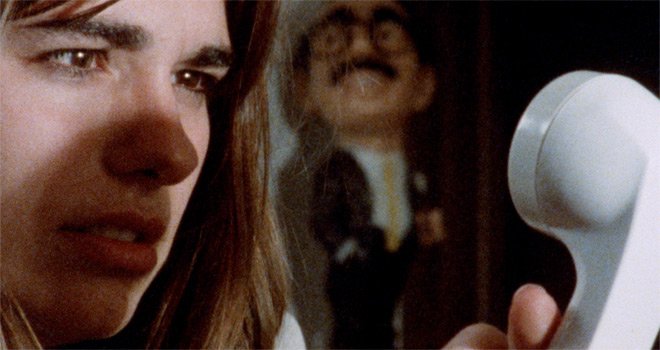
Evan Gordon Presents: Disconnected (1984)
Gorman Bechard, 1984, USA, 84 min
Featuring a live virtual post-screening Q&A with director Gorman Bechard!
Alicia has been receiving strange phone calls in which loud and ghastly sounds echo through the receiver. Her relationship with her boyfriend, Mike, has hit a dead end and Alicia fears he's having an affair with her twin sister, Barbara Ann. And all the while, a psychotic slasher is murdering young women with the police powerless to stop him. But then Alicia meets kind and nerdy Franklin. Will he be the man she's been searching for, or will his own dark secrets destroy their newfound happiness. Gorman Bechard's (PSYCHOS IN LOVE) directorial debut, DISCONNECTED is a low budget, regional slasher oddity that subverts genre expectations, leading to a brutal and unsettling finale.

Leila and the Wolves
Heiny Srour, Lebanon/Palestine, 1984, 90 min
Leila, a young Lebanese woman living in London, travels back in time through 20th century Lebanon and Palestine. Leila and the Wolves brings together documentary elements and evocations of Arab mythology. For several years, Srour captured images in often dangerous locations, combining them with archive films to reconstruct conventional historical narratives. Focusing on the often neglected political and social contributions of women, the film brings a feminist, but ironic perspective on the region's conflicted colonial past.
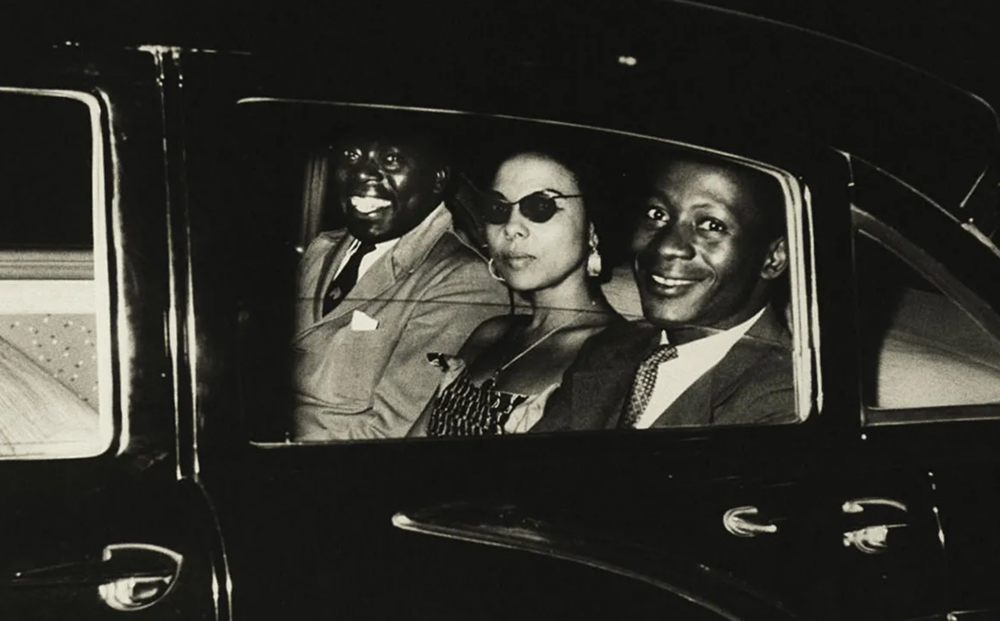
BAP Presents: Soundtrack to a Coup d'Etat
Johan Grimonprez, 2024,Belgium/France/Netherlands, 150 min
From the Congo to Harlem and back again, Johan Grimonprez’s kinetic, urgent documentary delivers the politics of decolonization in jazz form, replete with virtuosic archival riffs, historical text in the form of Blue Note album covers, and musical performances by jazz legends (Louis Armstrong, Dizzy Gillespie, Nina Simone) who in the ‘60s doubled as cultural ambassadors to Africa. Their roles as unknowing decoys in the CIA’s plot to assassinate Congo’s prime minister Patrice Lumumba threads through this deeply researched, densely textured tapestry — which scrambles the simplistic good guys/bad guys narrative, foregrounds powerful women behind the revolution (Simone, Abbey Lincoln, and activist/chief advisor to Lumumba, Andrée Blouin), and sounds a call to clear-eyed interrogation of Western powers’ murderous collusions in the guise of liberal values.
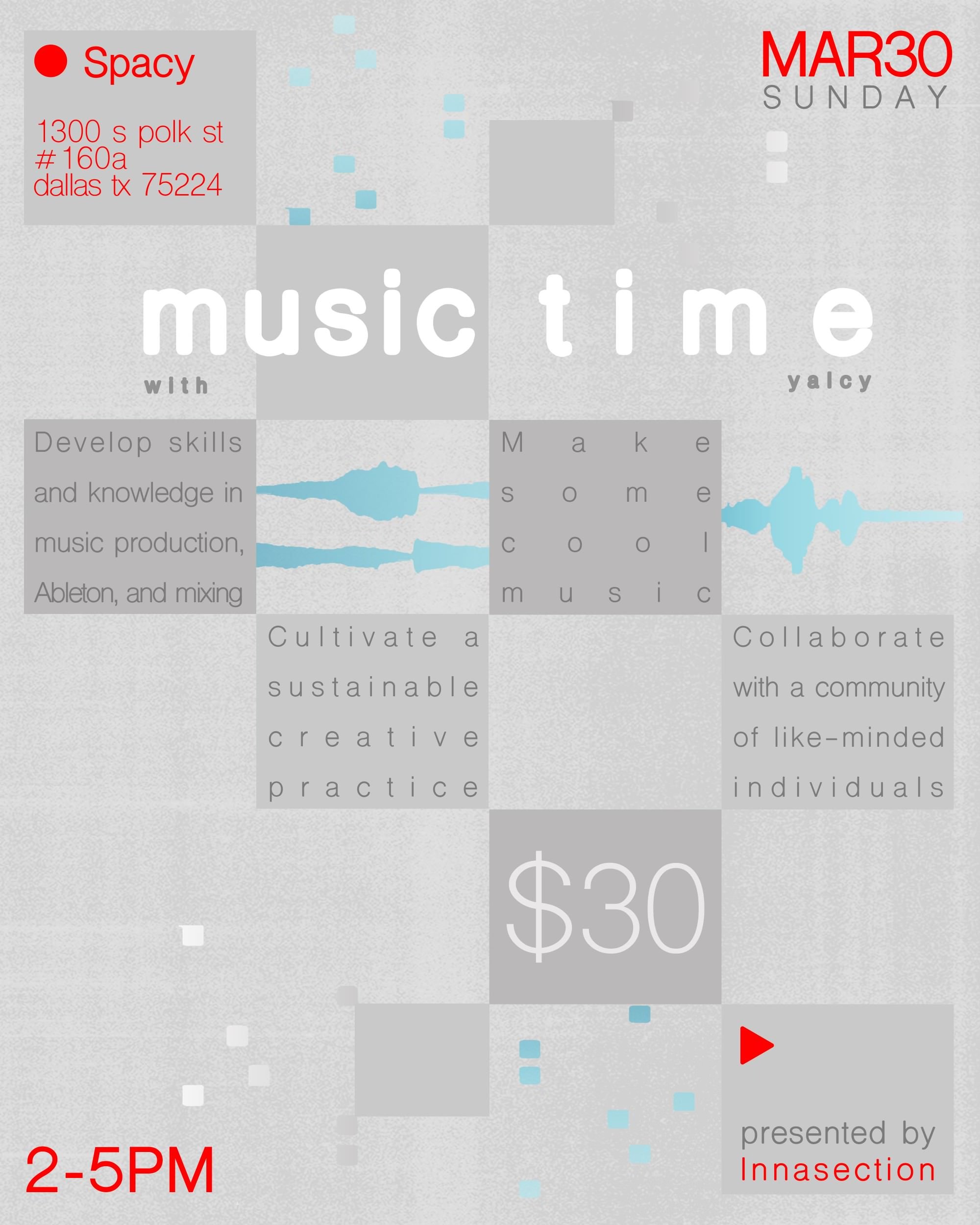
Music Time with Yalcy
Yalcy is a Dallas based DJ & producer that also runs the DFW based record label Innasection.
Music Time is a class in which you will:
Collaborate with a community of like-minded individuals
Cultivate a sustainable creative practice
Develop skills and knowledge in music production, Ableton and mixing
Make some cool music
Class is Sunday, Jan 26th from 2-5pm. $30 admission to this class. In addition, you can book 3 classes at once for $60!

Downwinders at Risk Presents: Disrupt and Dismantle
Event Date: Thursday, March 27, 2025
Doors Open: 5:30pm
6pm - Screening starts
6:45pm - Discussion starts
Kick off Earth Month by connecting with local environmental justice campaigns happening in your local backyard. Downwinders at Risk, a DFW-based environmental justice nonprofit, is hosting a 40-minute BET episode special, "Disrupt and Dismantle, " documenting Dallas's Shingle Mountain that follow also feature a post-screening discussions led by Dr. Marsha Jackson and other folks involved in removing Shingle Mountain.

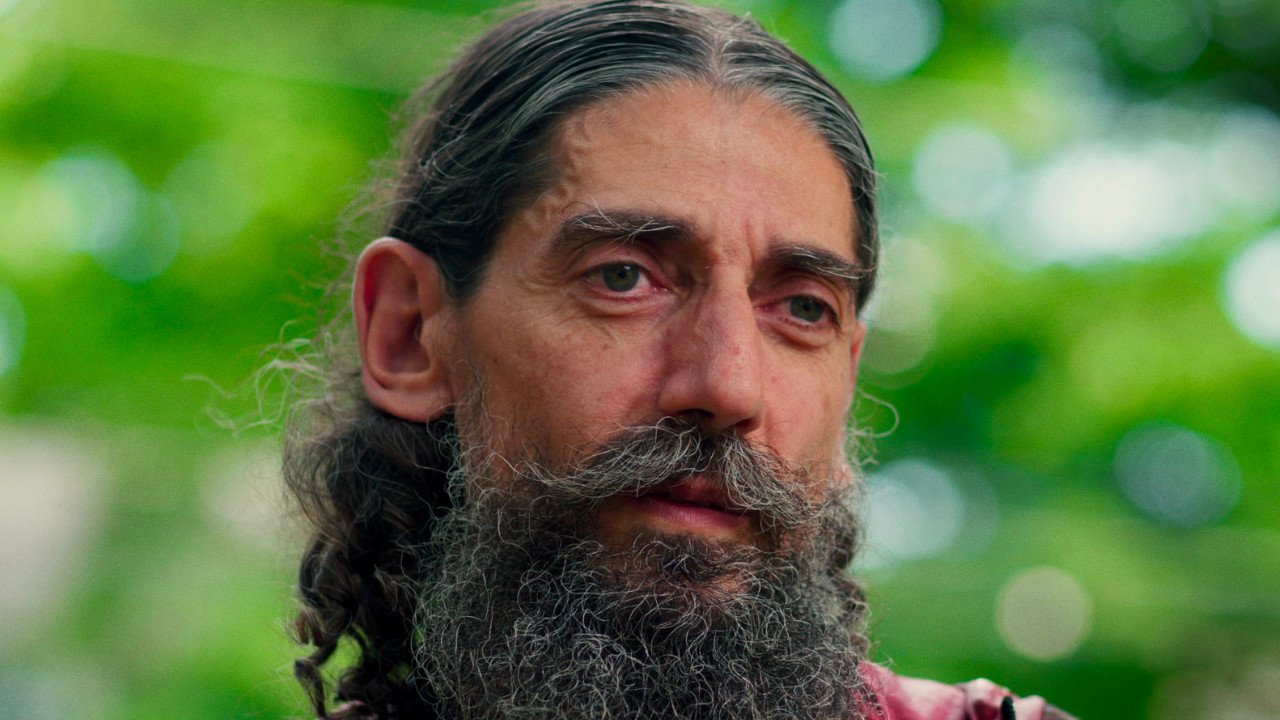
Failed State
Christopher Jason Bell, Mitch Blummer, 2023, USA, 85 min
Dale spends the majority of his time transporting various goods to people while attempting to carve out a social life in-between. Eventually the weight of work, his declining health and decaying social relations become too heavy to bear.

LAFFD 2025: The Major Tones
Dir. Ingrid Pokropek; 2023; Chile; 85 min
Texas Premiere
It’s winter holidays and fourteen-year-old Ana discovers that the metal plate she has in her arm from an accident she suffered as a child is now receiving a strange message in Morse code.

LAFFD 2025: The Day I Met You
Dir. André Novais Oliveira; 2023; Brazil; 71 min
Texas Premiere
Zeca tries to get up early to catch the bus and arrive an hour and a half later at the neighboring town’s school, where he works as a librarian. Waking up early is evermore difficult: something prevents him from maintaining his routine. One day, Zeca meets Louisa.

LAFFD 2025: Malqueridas
Dir.Tana Gilbert; 2023; Chile; 75 min
Texas Premiere
They are women. They are mothers. They are inmates serving long sentences in a prison in Chile. Their children grow up far from them, but remain in their hearts. Malqueridas reconstructs their stories through the images they themselves shot with cell phones prohibited inside the prison.

LAFFD 2025: Territory
Dir. José Celestino Campusano; 2024; Argentina; 89 min
US Premiere
Román, who is dedicated to the protection of political leaders and tries to develop himself as a trainer and manager of boxers, is harassed by a duo of abusive representatives who in turn have been hired as a shock force by an opposing political party.
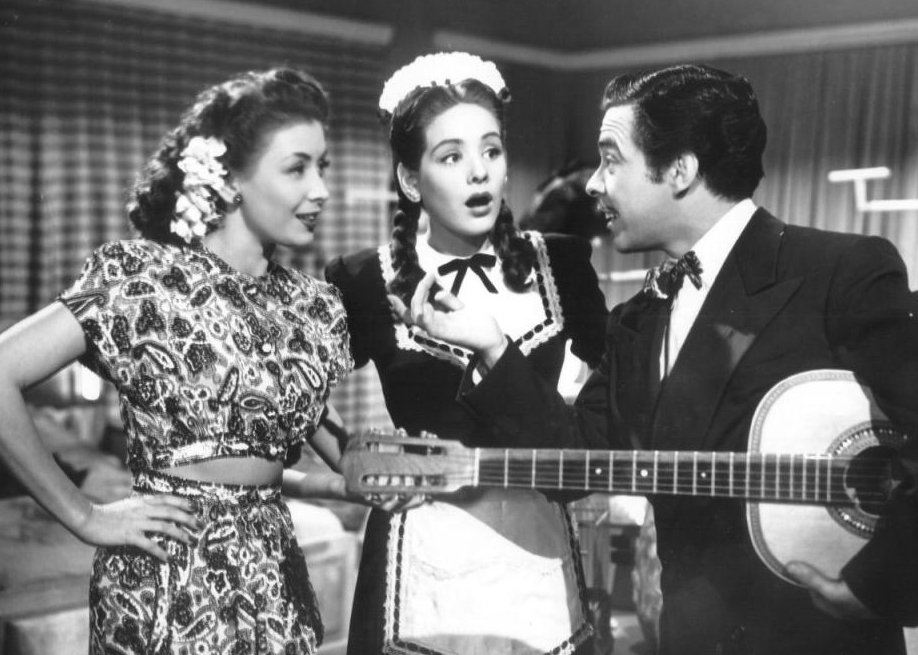
LAFFD 2025: Tender Pumpkins
Dir. Gilberto Martinez Solares; 1949; Mexico; 101 min
Tin Tan plays a broke man who is trying to put on a musical to pay his debts.

LAFFD 2025: Greice
Dir. Leonardo Mouramateus; 2024; Brazil/Portugal; 110 min
Texas Premiere
Greice, a 21-year-old Brazilian girl, studies at Fine Arts university in Lisbon. In the early days of summer, she gets involved with a mysterious guy: Afonso. The couple is accused of a strange accident that occurs at the students’ welcoming night party..

LAFFD 2025: What We Wanted to Be
Dir. Alejandro Agresti; 2024; Argentina; 84 min
North American Premiere
A man and a woman meet at the same cafe every Friday for years. They fall in love, but they never kiss or reveal their true names. When reality comes to the surface, they will need to assess whether they can stay together.

LAFFD 2025: El Mirador
El Mirador | Dir. Diego Hernandez; 2024; Mexico; 75 min.
Texas Premiere
Annya and Guillermo are aspiring actors entering adulthood in Tijuana. Guillermo works at a call center and Annya is an Uber driver. Suddenly, Annya accepts a ride from a director who has just returned to the city to produce a film.

LAFFD 2025: Minotaur
Dir. Joaquín Uribe; 2024; Colombia; 82 min
North American Premiere
Omar Bautista is a 60-year-old man who was sentenced to prison for murder. After almost a decade in prison, Omar gets the benefit of 72-hour releases. A documentary filmmaker tries to follow him during these leaves, which turn into a sort of psychological hunt.
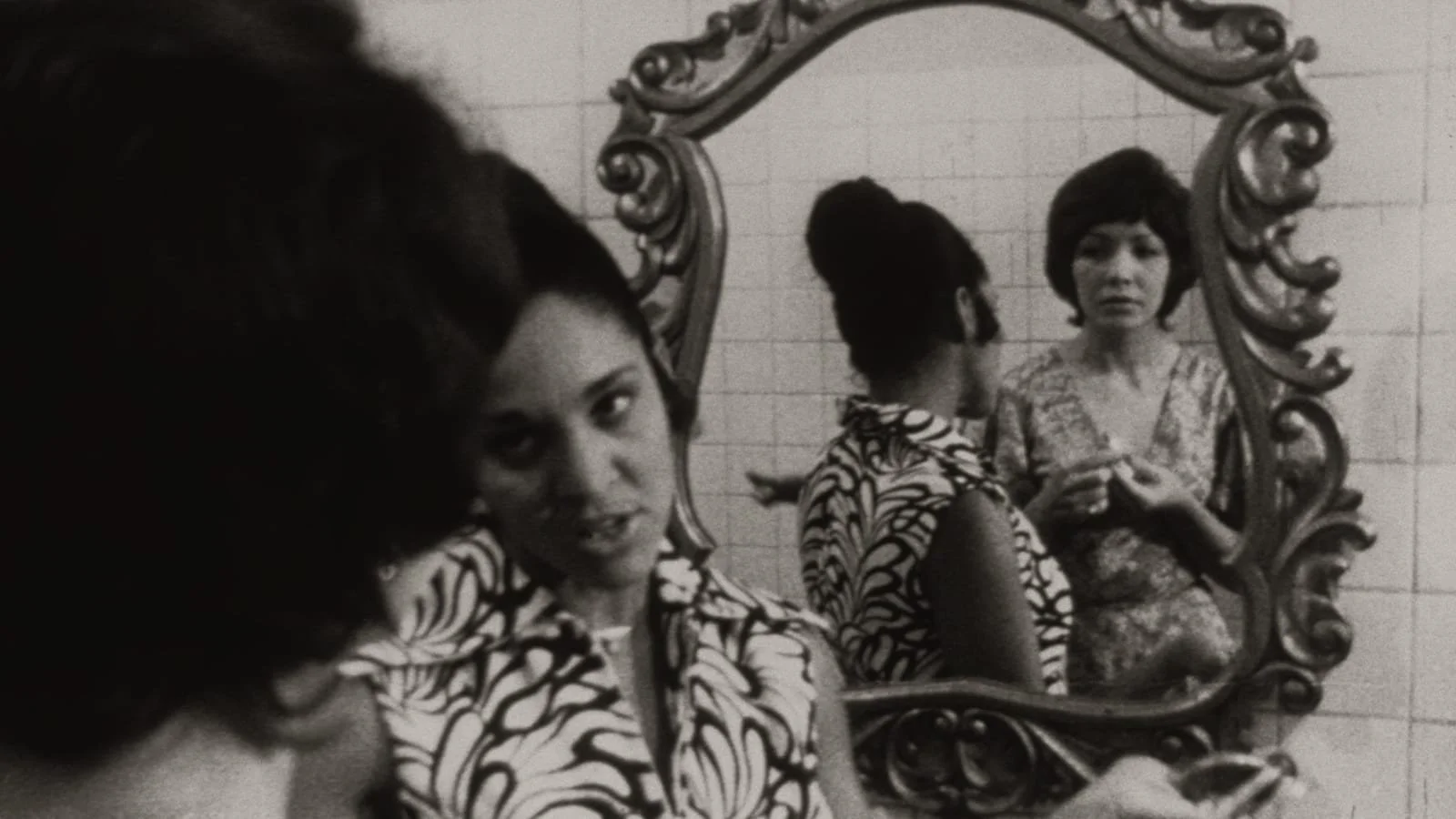
LAFFD 2025: One Way or Another
Dir. Sara Gomez; 1977; Cuba; 74 min
Middle-class teacher Yolanda falls in love with factory worker Mario, but their relationship is challenged by their different views, values and prejudices. As Yolanda’s bias surfaces when teaching underprivileged children, Mario’s machismo is undermined by Yolanda’s sense of independence.
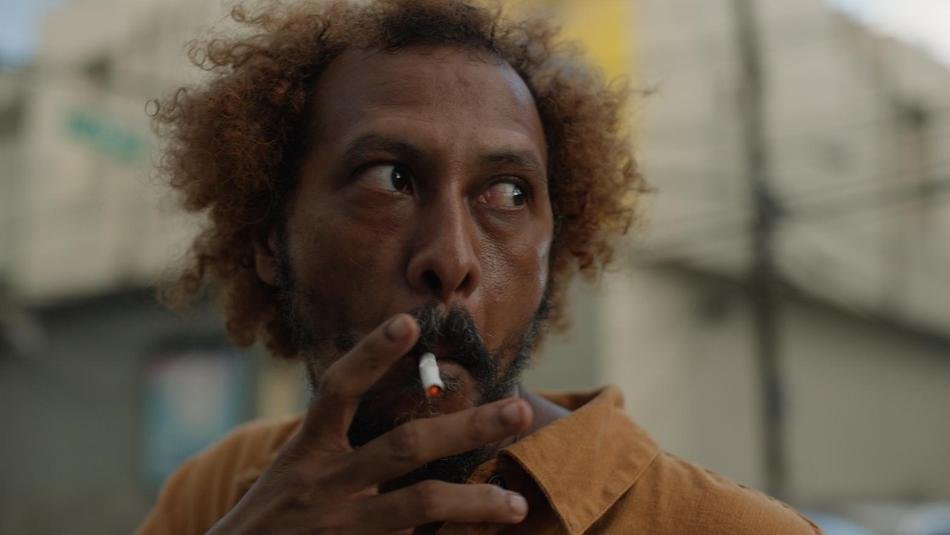
LAFFD 2025: Bionico's Bachata
Dir. Yoel Morales; 2024; Dominican Republic; 80 min
DFW Premiere
Bionico is a hopeless romantic, and also addicted to crack, who must take control of his life before his fiancée leaves a rehabilitation center. It’s a raw vision of love in a hostile Caribbean city.

A Tale of Winter
Eric Rohmer, France, 1992, 114 min
The concluding installment of the “Tales of the Four Seasons” tetralogy is a breezy take on the classic American romantic comedies that influenced Rohmer and his New Wave peers. Set in the Rhône Valley and taking full advantage of its golden vineyards, A Tale of Autumn concerns simultaneous schemes to find a new love for reserved winegrower and widow Magali (Beatrice Romand). While Magali’s son’s girlfriend (Alexia Portal) attempts to pair her with a former professor and lover (Didier Sandre), Magali’s friend Isabelle (Marie Rivière) assumes a false identity in order to bait eligible bachelor Gérald (Alain Libolt). The misunderstandings that follow are pure Rohmer in revealing the humor of human folly and foible.

Il Posto
Ermanno Olmi, Italy, 1961, 93 min
When young Domenico (Sandro Panseri) ventures from the small village of Meda to Milan in search of employment, he finds himself on the bottom rung of the bureaucratic ladder in a huge, faceless company. The prospects are daunting, but Domenico finds reason for hope in the fetching Antonietta (Loredana Detto). A tender coming-of-age story and a sharp observation of dehumanizing corporate enterprise, Ermanno Olmi’s Il posto is a touching and hilarious tale of one young man’s stumbling entrance into the perils of modern adulthood.

A Tale of Autumn
Eric Rohmer, France, 1998, 111 min
The concluding installment of the “Tales of the Four Seasons” tetralogy is a breezy take on the classic American romantic comedies that influenced Rohmer and his New Wave peers. Set in the Rhône Valley and taking full advantage of its golden vineyards, A Tale of Autumn concerns simultaneous schemes to find a new love for reserved winegrower and widow Magali (Beatrice Romand). While Magali’s son’s girlfriend (Alexia Portal) attempts to pair her with a former professor and lover (Didier Sandre), Magali’s friend Isabelle (Marie Rivière) assumes a false identity in order to bait eligible bachelor Gérald (Alain Libolt). The misunderstandings that follow are pure Rohmer in revealing the humor of human folly and foible.


LAFFD Presents: Belmonte
Federico Veiroj, Uruguay/Spain/Mexico, 2018, 75 min
FREE Screening!
Multiple award-winning Uruguayan director, Frederico Veiroj, returns to the international festival circuit with his fourth feature, BELMONTE. Belmonte is a middle-aged painter who creates unsettling and often confusing works of art that seem to speak to a growing melancholy and increasingly blurred lines between reality and dark fantasy. When he discovers his ex-wife becomes pregnant with another man’s child and is met with growing resistance over the custody of their daughter, Celeste, Belmonte retreats further into a world of foreboding unknown.

Working Girls
Lizzie Borden, United States, 1986, 93 min
Sex work is portrayed with radical nonjudgment in Lizzie Borden’s immersive, richly detailed look at the rhythms and rituals of society’s most stigmatized profession. Inspired by the experiences of the sex workers Borden met while making her underground feminist landmark Born in Flames, Working Girls reveals the textures of a day in the life of Molly (Louise Smith), a photographer working part-time in a Manhattan brothel, as she juggles a steady stream of clients, balances relationships with her coworkers with the demands of an ambitious madam, and above all fights to maintain her sense of self in a business in which the line between the personal and the professional is all too easily blurred. In viewing prostitution through the lens of labor, Borden boldly desensationalizes the subject, offering an empathetic, humanizing, often humorous depiction of women for whom this work is just another day at the office.

A Tale of Summer
Eric Rohmer, France, 1996, 114 min
According to Rohmer, the third film of the “Tales of the Four Seasons” is his “most personal vehicle.” Based on events from Rohmer’s youth, A Tale of Summer follows amateur musician Gaspard (Melvil Poupard) to a seaside resort in Dinard, on the coast of Brittany. There three women (Amanda Langlet, Gwenaëlle Simon, Aurelia Nolin) each offer the possibility of romance, but Gaspard’s inability to commit to just one places all of his chances at love in jeopardy. Summer features Rohmer’s wistful observations on indecisiveness and the fickle nature of desire, as brought to life by a talented young cast in a picturesque setting.
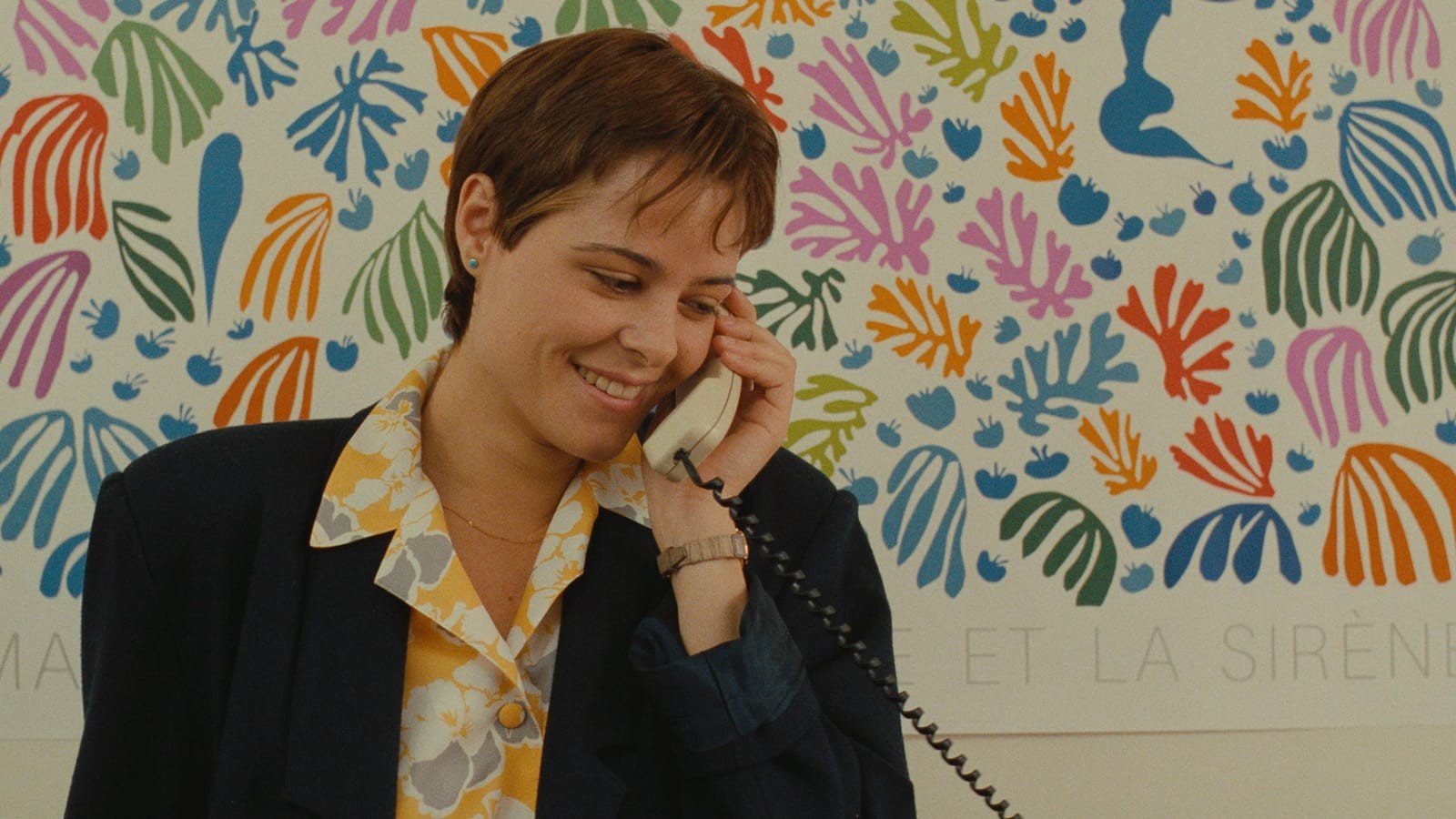
A Tale of Springtime
Eric Rohmer, France, 1990, 107 min
In the first film of “Tales of the Four Seasons,” a burgeoning friendship between philosophy teacher Jeanne (Anne Teyssèdre) and pianist Natacha (Florence Darel) is strained by jealousy, suspicion, and intrigue. Natacha encourages Jeanne to pursue the former's father, Igor (Hugues Quester), in order to supplant Eve (Eloïse Bennett), the young girlfriend Natacha loathes. Natacha’s scheme, however, risks alienating those closest to her as well as entangling Jeanne in a romantic drama she has vowed to avoid. A Tale of Springtime demonstrates Rohmer in full command of subtle visual storytelling as he contrasts the brightness of his characters’ Parisian and suburban surroundings with their conflicting desires, ideas, and temperaments.

Rosetta
Luc Dardenne and Jean-Pierre Dardenne, Belgium, 1999, 93 min
The Belgian filmmaking team of brothers Luc and Jean-Pierre Dardenne turned heads with ROSETTA, an intense vérité drama that closely follows a poor young woman struggling to hold on to a job to support herself and her alcoholic mother. It’s a swift and simple tale made revelatory by the raw, empathetic way in which the directors render Rosetta’s desperation, keeping the camera nearly perched on her shoulder throughout. Many have copied the Dardennes’ style, but few have equaled it. This ferocious film won big at Cannes, earning the Palme d’Or for the filmmakers and the best actress prize for the indomitable Émilie Dequenne.

Archives Beyond Activism Workshop
This workshop collaboration is with Dallas Contemporary’s DABF Satellite Programming—a citywide initiative celebrating the creativity and community at the heart of art book publishing, as part of this year’s Dallas Art Book Fair.
Free admission, limited capacity
In this workshop, attendees will put archival images classified as LBGT in dialogue with their own photo libraries, creating a new artifact that can be left in a public place. We will each use the space of one page to think about what queerness and transness actually is in the world — the way it liberates people, the way it threatens all structures meant to oppress everyone. And we’ll go behind the scenes of iconic images in various social campaigns to understand fully how tender, personal experience fuels collective action.
This workshop is facilitated by Lyndsay Knecht, Editorial and Engagement Lead of Red Hot and will include music from the nonprofit label’s catalog with an emphasis on TRAИƧA, the 46-track spiritual journey featuring 100+ contributors celebrating trans artistry and influence. Admission is free. Attendees will receive information about archives accessible to them for future projects. For those who are not able to make it, RSVPed patrons will still receive this information at a later time through email.

Evan Gordon Presents: Emma Mae
Jamaa Fanaka, 1976, USA, 100 min
Virtual Q&A w director Jamaa Fanaka’s granddaughter & biographer Khadijah Fanaka
Fanaka's second feature, EMMA MAE, tells the story of a naive young woman who moves from the Deep South to Watts. Initially finding herself at odds with her surroundings, Emma eventually gains acceptance from a local drug addict and dealer. But when he's arrested and jailed, she plans a daring bank robbery to bail him out... Featuring a cast of mostly non-professionals and shot entirely on location in Watts, this uniquely subversive action film is an insider's view of black, working-class LA neighborhoods.

Satan Kingdom Babylon
Marie Šprincl, Petr Šprincl, 2024, Czech Republic, 77 min
A hyperreal exploration of conspiracy theories using the narratives of various hate groups in Trump's America. A detective plot telling one possible truth about the mysterious disappearance of a young girl in a hotel standing in a post-apocalyptic desert landscape. The anonymous hotel as a deus ex machina - a simulacrum of past, present and future through which the detective is led by clues ranging from the Knights of the Ku Klux Klan to the ultra-Orthodox Jewish sect Neturei Karta. The End is Here.

Happy End
Michael Haneke, France/Germany/Austria, 2017, 107 min
From Michael Haneke, Oscar-winning director of CACHÉ, THE WHITE RIBBON, and AMOUR, comes a multi-generational drama starring Isabelle Huppert and Mathieu Kassovitz as chilly siblings, with Jean-Louis Trintignant as the paterfamilias of their upper class family of French developers. Situated in a grand home in Calais (site of the “Jungle,” a notorious refugee camp), Trintignant and Huppert revisit their edgy father-daughter relationship from AMOUR. While HAPPY END is not a sequel to that film, it does continue the director’s focus upon (in Manohla Dargis’s words in The New York Times): “…the rot and wretchedness of the bourgeoisie… [with an] emphasis again on surveillance culture, class pathology and anomie…” Haneke masterfully withholds information -- then powerfully shocks you with one profound revelation after another, much of it tinged with his signature nihilistic black humor.
